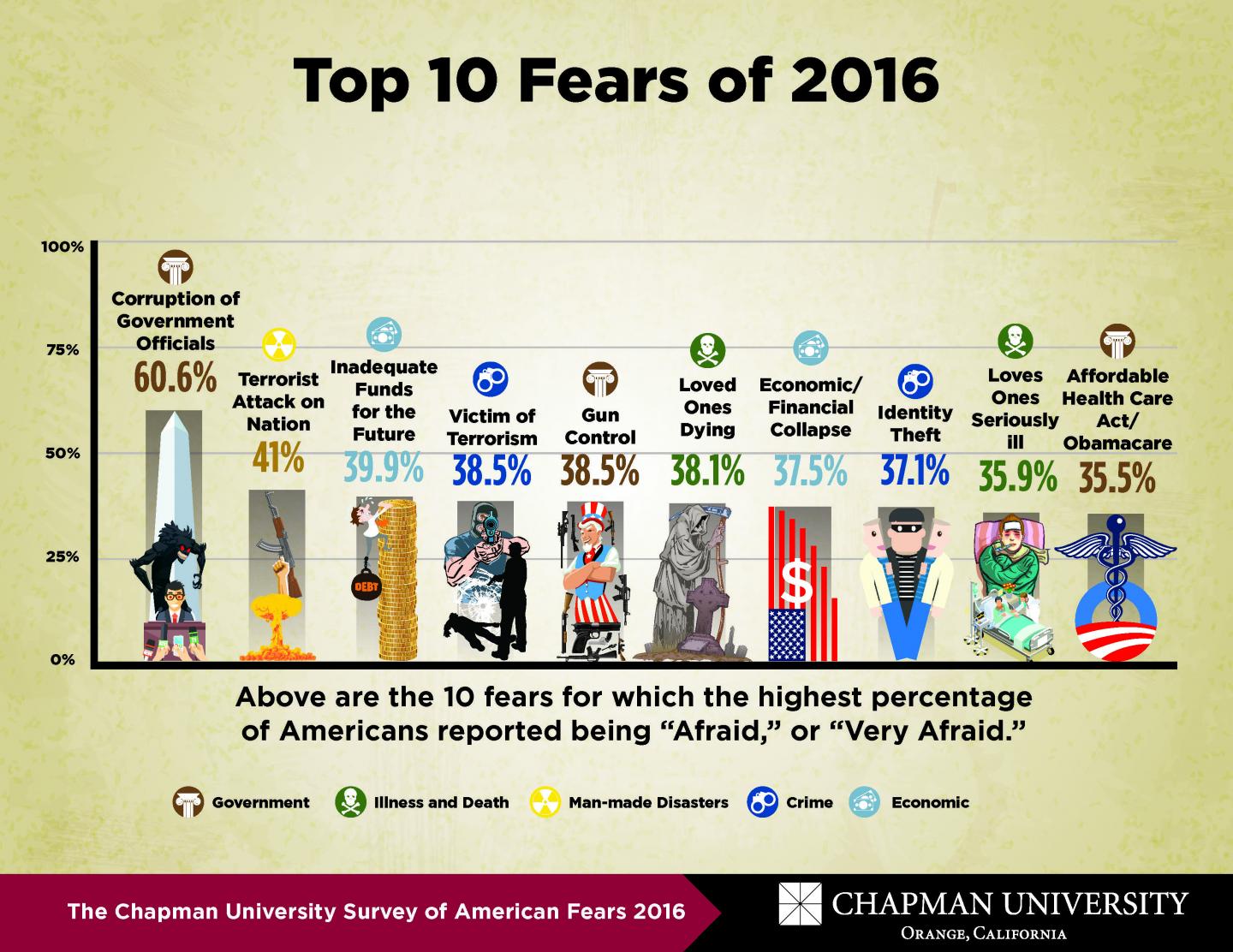
We ain't afraid of no ghosts or zombies, according to a new national survey that suggests Americans are most fearful of government corruption.
More specifically, 60 percent of the public fears the corruption of government officials. About half of Americans believe that the government is concealing information about the 9/11 attacks, for example, a new survey suggested.
Clowns were also low on the fear list, with fewer than 10 percent of survey respondents saying they feared the painted grinners. That's despite reports of creepy clowns popping up in various states, scaring and in some instances harming people. However, the clown sightings were first reported in the U.S. this year in late summer and early fall, while the survey was conducted in the spring. [Halloween 2016: A Guide to the When, Why, What and How]
What really scares people
The new findings are part of a broader survey called the Survey on American Fears – Wave 3 and included completed surveys from 1,511 Americans over age 18 during a month this spring. The 45-question survey included questions, such as, "How afraid are you of the following?" (options included zombies, blood, needles, ghosts, the dark, vaccinations and whooping cough) and, "How much of the time do you think you can trust the national government?"
Each completed survey was weighted based on the proportion of people from that demographic in the general American population, although weighting was capped at the extreme ends to prevent skewing of the data. (A recent analysis found that weighting techniques have led, in one survey, to a single black Trump supporter in Illinois having his answers to national polls weighted 30 times more than the average respondent, skewing that national poll, The New York Times reported. That data was not "trimmed" or capped to avoid extreme over- or under-weighting.)
Perhaps understandably, given the vitriol of the current election season, people's top fear was the corruption of government officials, while the second most-stated fear was a terrorist attack (41 percent).
Rounding out the top-20 list, with percentages of respondents who said they were "afraid" or "very afraid," here are the things Americans fear:
Get the world’s most fascinating discoveries delivered straight to your inbox.
- not having enough money: 39.9 percent
- being a victim of terror: 38.5 percent
- government restrictions on firearms and ammunition: 38.5 percent
- loved ones' deaths: 38.1 percent
- economic or financial collapse: 37.5 percent
- identity theft: 37.1 percent
- loved ones falling seriously ill: 35.9 percent
- the Affordable Care Act: 35.5 percent
- credit card fraud: 35.5
- biological warfare: 34.8
- reptiles: 33.2
- government tracking of personal data: 33.1
- high medical bills: 33.1
- the U.S. getting involved in another world war: 32.3
- global warming and climate change: 32.3
- nuclear weapons attack: 31.5
- cyberterrorism: 30.7
- being hit by a drunk driver/crime: 30.4
These fears do not correspond with the odds of dying from various factors: In 2014, terrorism was linked to 32,700 deaths worldwide, but most of those deaths occurred in a handful of countries outside of the U.S., while the same year, heart disease claimed the lives of 614,348 Americans. [The Top 10 Causes of Death]
The top fears have changed from the 2015 results, when people were most fearful of cybercrime and surveillance.
"The 2016 survey data shows us the top fears have shifted from last year's, which were heavily based in economic and 'Big Brother'-type issues, to include more health and financial fears this year," said lead researcher Christopher Bader, a professor of sociology at Chapman University in California. "People often fear what they cannot control," continued Bader, "and we find continued evidence of that in our top fears."
Monsters did not rank high in respondents' amygdala (the brain's fear center), it seems, with just 10 percent of respondents saying they were "afraid" or "very afraid" of zombies, about 9 percent saying the same about ghosts and 8 percent saying so for clowns.
Here are the 20 least-common fears:
- becoming the victim of a property crime: 18.6 percent
- sexual assault by someone you know: 18.1
- whites no longer being the majority in the U.S.: 17.9
- murder by someone you know: 17.5
- stalking: 17.4
- small, enclosed spaces: 16.8
- needles: 16.7
- computers replacing people in the workforce: 16.6
- technology you don't understand: 15.7
- a large volcanic eruption: 15
- germs: 14.9
- flying: 12.1
- blood: 11.7
- animals: 10.9
- significant other cheating on you: 10.2
- zombies: 10.2
- strangers: 9.8
- ghosts: 8.9
- clowns: 7.8
- others talking about you behind your back: 6.8
Original article on Live Science.

Tia is the editor-in-chief (premium) and was formerly managing editor and senior writer for Live Science. Her work has appeared in Scientific American, Wired.com, Science News and other outlets. She holds a master's degree in bioengineering from the University of Washington, a graduate certificate in science writing from UC Santa Cruz and a bachelor's degree in mechanical engineering from the University of Texas at Austin. Tia was part of a team at the Milwaukee Journal Sentinel that published the Empty Cradles series on preterm births, which won multiple awards, including the 2012 Casey Medal for Meritorious Journalism.


